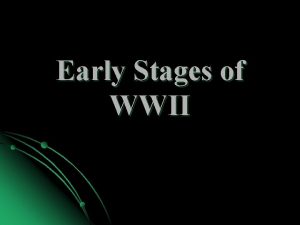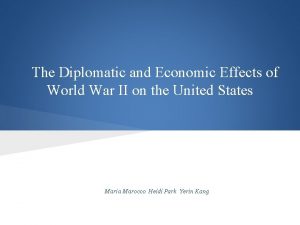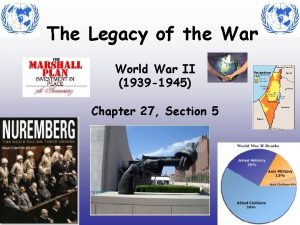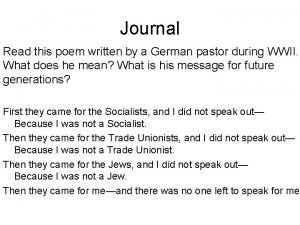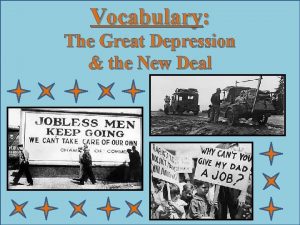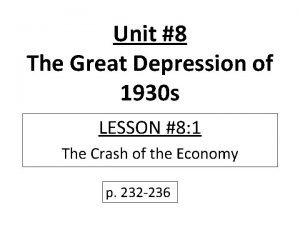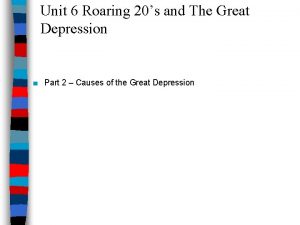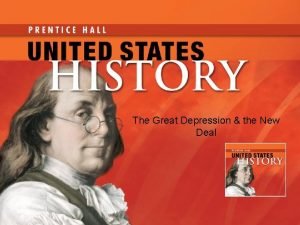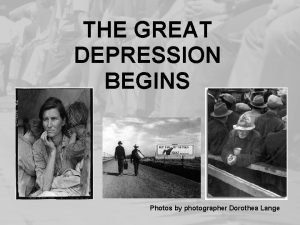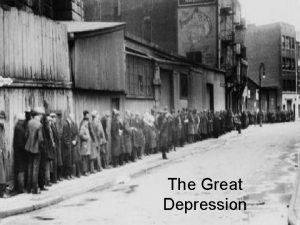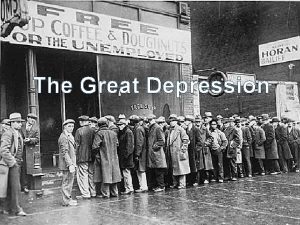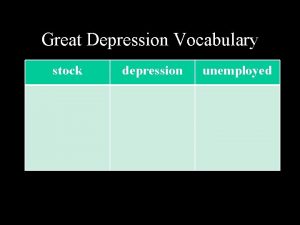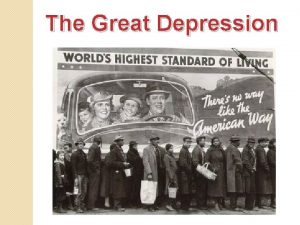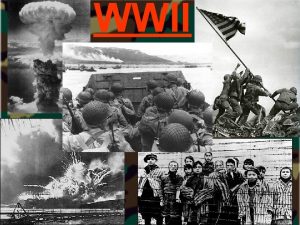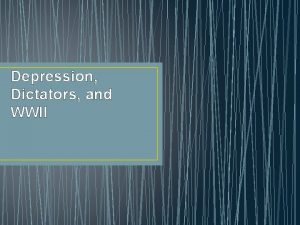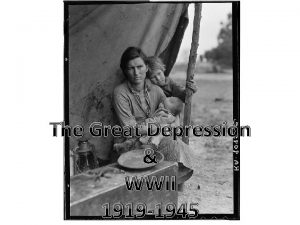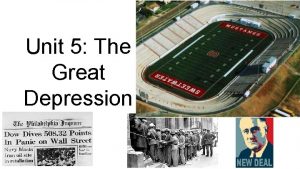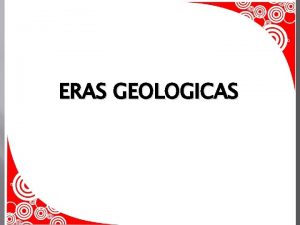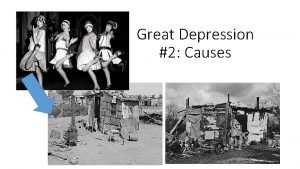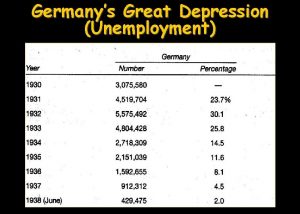Unit 11 The Great Depression WWII MAJOR ERAS






















- Slides: 22

Unit 11 The Great Depression WWII

MAJOR ERAS IN TEXAS HISTORY WHY DO HISTORIANS DIVIDE THE PAST INTO ERAS? n Historians divide the past into eras so it is easier to identify cause and effect of the great events/people in history. n

WHY HISTORIANS DIVIDE THE PAST INTO ERAS n History is divided into eras so it is easier to identify cause and effect of the great events/people in history

Texas in the Great Depression and World War II n Great Depression n n n Boom and Bust Cycle of cotton and agriculture New Deal Programs Dust Bowl Sam Rayburn Relieved by World War II n n Rationing Military Installations n n Internment camps Economy improves in Texas Large number of Texans, men and women serve in the military Industries grow – oil and gas and agriculture

Texas in the Great Depression and World War II n n 1929 -1939 – The Great Depression 1932 -1941 – Dust Bowl 1933 -1938 - New Deal Programs 1941 -1945 – World War II

IMPACT OF “BOOM AND BUST” n n n Great Depression through World War II Due to overproduction of agricultural products and the Stock Market Crash prices dropped Dust Bowl (bad agricultural practices and droughts led to a decade of poverty and disillusionment Businesses began to close and Texans lost their jobs. The demand for agricultural products was not as high as the supply, causing farmers to lose their farms World War II increased the demand for agricultural products.

IMPACT OF “BOOM AND BUST” n n n World War II to Present Agricultural became more commercial and less small farms Prices have fluctuated due to weather, supply and demand

POLITICAL, ECONOMIC, AND SOCIAL IMPACT OF MAJOR EVENTS ON THE HISTORY OF TEXAS Great Depression- Political Impact n n n New Deal programs to provide relief – Civilian Conservation Corps (CCC), Public Works Administration (PWA) and Works Progress Administration (WPA) John Nance Garner from Uvalde was Vice President under Franklin Roosevelt (1933 -1941) Sam Rayburn was the Speaker of the House (U. S. House of Representatives) and pushed for regulatory legislation that would protect the public interest. He served longer than any other legislator as Speaker of the House Miriam “Ma” Ferguson and W. Lee “Pappy” O’Daniel were governors during the Depression Big supporter of FDR

POLITICAL, ECONOMIC, AND SOCIAL IMPACT OF MAJOR EVENTS ON THE HISTORY OF TEXAS Great Depression- Economic impact n n n Texas agricultural industry suffered because of the Dust Bowl Funding for education and government services were severely cut Prices for food and other products fell Oil industry began to increase due to demand New Deal programs employed over 100, 000 Texans, built and repaired bridges, dams, roads, and parks

POLITICAL, ECONOMIC, AND SOCIAL IMPACT OF MAJOR EVENTS ON THE HISTORY OF TEXAS Great Depression- Social impact n n North Texans migrated to California hoping for work The social security system was established Dust Bowl – Dust storms swept through the Great Plains causing erosion, drought, and destruction of crops- many farms repossessed by banks Texas celebrated its centennial the political, economic, and social impact of major events in the latter half of the 20 th and early 21 st centuries such as major conflicts, the emergence of a two-party system, political and economic controversies, immigration, and migration

POLITICAL, ECONOMIC, AND SOCIAL IMPACT OF MAJOR EVENTS ON THE HISTORY OF TEXAS n World War II- Political impact n Influential powers n n n n n Oveta Culp Hobby – Organized Women’s Army Corp Admiral Chester W. Nimitz – Commander of Pacific Fleet Dwight Eisenhower – Allied Commander Sam Rayburn – Speaker of the House (supported financial support for the war effort) John Nance Garner – Vice President Major military bases and airfields Over 750, 000 Texans served in the war Audie Murphy – Most decorated soldier Many Texans received the Medal of Honor

POLITICAL, ECONOMIC, AND SOCIAL IMPACT OF MAJOR EVENTS ON THE HISTORY OF TEXAS n World War II- Economic impact n n n Military Facilities Production of Naval and Aircraft Plants/factories n n Ammunition & Petroleum Improved Texas economy n n n Oil and Gas industry Lumber Agriculture Cotton Women joined the workforce

POLITICAL, ECONOMIC, AND SOCIAL IMPACT OF MAJOR EVENTS ON THE HISTORY OF TEXAS n WWII- Social/Economic n impact Sacrificed on the home front n n Migration to urban areas n n Growing economy Jobs n n n Rationing- food and goods Women joined the workforce Desire of minorities to be integrated because of their involvement in the war effort Over 22, 000 Texans died in the war

GEOGRAPHIC DISTRIBUTION AND PATTERNS IN TEXAS DURING THE 19 th AND 20 th CENTURIES n Texas in the Great Depression and World War II n n Why did the Dust Bowl affect the Panhandle more than other regions? Why were so many military installations located in Texas?

GEOGRAPHIC DISTRIBUTION AND PATTERNS IN TEXAS DURING THE 19 th AND 20 th CENTURIES n n Dust Bowl The climate in the Panhandle is windy, hot, and dry during the summer. Combined with three years of drought and lack of soil conservation, dust storms occurred destroying crops and causing Texans to migrate from the Panhandle and Texas. It also caused a change in farming techniques and government policies.

WAYS TEXANS HAVE ADAPTED TO AND MODIFIED THE ENVIRONMENT n The Great Depression n n Soil Conservation – Texans planted trees and natural vegetation in the Texas Panhandle to prevent erosion. The result has been fewer sand storms and erosion of the land. Farming techniques were changed and the use of irrigation systems was developed. During the 1930’s & 1940’s fewer acres of cotton was planted

WAYS TEXANS HAVE ADAPTED TO AND MODIFIED THE ENVIRONMENT n Age of oil n n n Road and railroad systems – road and railroad tracks were built across Texas during this period time to accommodate the fastest mode of transportation, the train and the automobile. These roads and tracks allowed Texas farmers to reach new markets in and outside of Texas. Hurricane 1900 – after the hurricane, the city of Galveston built a seawall and increased the elevation of the city. The environmental consequences that have occurred due to these modifications are that the city rarely floods and structures had to be raised Houston Ship Channel – built in 1914, the Houston Ship Channel was built to connect Houston with the Gulf of Mexico to improve the economy of Houston. Since then, it has been widened and deepened. The environmental results have been an increase in pollution, collisions, explosions, and oil spills.

WAYS GEOGRAPHIC FACTORS HAVE AFFECTED THE POLITICAL, ECONOMIC, AND SOCIAL DEVELOPMENT OF TEXAS n Political Development n n Economic Development n n New Deal Programs developed methods to prevent erosion Crop Prices dropped Farms were lost to the bank Population decreased in Panhandle towns Social Development n n Texans migrated to California and other parts of the nation Implemented ways to stop erosion – Planting Trees, contour plowing, terracing

IMPACT OF ECONOMIC CONCEPTS WITHIN THE FREE ENTERPRISE SYSTEM ON THE ECONOMY OF TEXAS n n Free enterprise system – Type of economy where people own and run their own businesses. Supply and demand – Supply is the amount of goods available and demand is the desire to own something and the ability to pay for it. n The crash of the Stock Market resulted in Americans not having enough money to buy products. This event and the overproduction of agriculture products and oil and gas led to a drop in prices. All of these events led to the closure of businesses, and loss of jobs and homes in Texas.

IMPACT OF ECONOMIC CONCEPTS WITHIN THE FREE ENTERPRISE SYSTEM ON THE ECONOMY OF TEXAS n Profit – Profit is the degree to which persons or organizations are better off financially at the end of a time period than they were at the beginning. The increase in material well-being is termed profit. Profit is a motivational force in capitalism and in free enterprise. n Overproduction of agricultural products like cotton and oil and gas led to a drop in prices which led to smaller profits or no profit. Without a profit, businesses during the Great Depression closed and workers lost their jobs

IMPACT OF ECONOMIC CONCEPTS WITHIN THE FREE ENTERPRISE SYSTEM ON THE ECONOMY OF TEXAS n Government regulation n New Deal Programs during the Great Depression created jobs that put Texans to work. Works Progress Administration (WPA), Public Works Administration (PWA), and Civilian Conservation Corp (CCC) put people to work building or improving public buildings such as schools, post offices, hospitals, coliseums, parks, swimming pools, and dams World competition n n Import/Export agricultural products Import/Export of oil

CONTRIBUTIONS OF TEXAS LEADERS n John Nance Garner ("Cactus Jack") n n Served as Vice President under Franklin Roosevelt (1933 -1941); Served in the Texas House of Representatives; he was Speaker of the House of Representatives (1931 -1933) Sam Rayburn n n As a longstanding member of the U. S. House of Representatives, Rayburn supported regulatory legislation such as the Securities and Exchange Commission and the Federal Communications Commission. Rayburn also pushed for building farm to market roads and providing electricity to rural areas
 Pah!
Pah! Advances in technology during wwii
Advances in technology during wwii Nye commission
Nye commission Wwii picture
Wwii picture Wwii picture
Wwii picture Ww2 study guide answer key
Ww2 study guide answer key Effects world war 2
Effects world war 2 1950s television history
1950s television history Wwii
Wwii Causes of ww2
Causes of ww2 Map of german aggression wwii
Map of german aggression wwii Wwii
Wwii Could wwii have been prevented
Could wwii have been prevented Wwii test review
Wwii test review Apush wwii dbq
Apush wwii dbq Vocabulary review causes of the depression
Vocabulary review causes of the depression Rarig great depression
Rarig great depression Great depression
Great depression The ingenious quarterback
The ingenious quarterback Foreclosure great depression
Foreclosure great depression Five effects of the great depression
Five effects of the great depression Five effects of the great depression
Five effects of the great depression How did the great depression impact the world
How did the great depression impact the world


